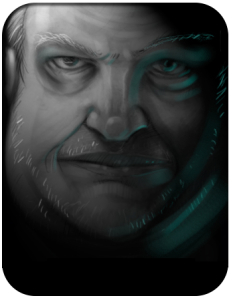DETECTIVE MOXLEY, Part 15: “Good News and Bad News”
“Carol?” said Mox. “Are you okay? I’ve been standing here for like ten minutes.”
“Yes, yes,” said Carol Latham. “I’m so sorry, Harold. It’s just… I’m sorry. Please come in. Please. Come in.”
Moxley took off his hat and, seeing no place to hang it, simply held on to it. He felt out of place in Carol’s home, as he always did. The place was auto-cleaned and spotless, scrubbed to sterility. There was not a crumb to be seen in the gleaming kitchen, not a child’s sock out of place. Neiring’s niece and nephew were nine and eight, respectively. How did you raise two kids in an antiseptic place like this? He had always assumed Carol’s unassuming nature was cover, a mask for an iron will and a murderous temper. Neiring had always told him he was crazy. Carol was just meticulous, he said. Also, she leased a RoomClean, one of those monstrous buglike robots that could repaint your garage when you weren’t looking. Moxley had never seen one and knew no one else who paid for such a monstrosity. Carol’s husband, Travis, was a securities broker and good at his job.
Robby and Tricia were sitting cross-legged on the living room floor. They both had their hands on the family cat. It was sleeping, sort of puddled between them in an off-white lump. Moxley remembered the cat. It was a behemoth, at least twice the size of a normal housecat. One of those genetically modified things the pet companies were pushing these days. Its hair was hypoallergenic — it really was hair, not fur — and the thing was guaranteed not to shed. It was also carefully selected to be docile. Wouldn’t do to have a twenty-kilo feline tearing around the place with a bad attitude. These were born without claws, but still. They had sharp teeth.
“Would you, would you, coffee?” Carol stammered. “Would you like any coffee, I mean? I could print some. If you want some. Coffee, I mean.”
“Sure,” said Moxley. “Although your coffee always spoils me, Carol.” He watched her with curiosity, still standing on the paneled floor of the entryway. His shoes were stained and muddy; he was afraid to track up the joint. He jerked his chin at the children in the living room. “Tricia. Robby. How’s school going?”
The children looked up at him and then went back to silently petting the cat. Well, they’d never been the most polite of children. Wasn’t his place to lecture them on manners, although his own father would have slapped the taste out of his mouth if he’d behaved that way, especially in front of company. He shrugged and, as carefully has he could, made his way to the paneled kitchen, hoping he wasn’t leaving any debris on the carpet. Carol finished filling his coffee cup, spilling some of it on the saucer as she handed it to him. He took it from her perhaps more quickly than was proper.
“Carol,” he said, “are you all right? “You pop an energy pill or something? Those things will turn you out, you aren’t careful.”
“I’m fine, fine,” said Carol. She looked at him and, close to her now, Moxley could see the deep bags under her eyes. She hadn’t slept. She’d tried to hide it, but her makeup wasn’t up to the task.
“It’s Ray, isn’t it?” said Moxley, trying to keep his voice low. He glanced to the children and then back to Carol. “Look, Carol, I’m… damn it, I’m sorry. Ray was my friend. He was probably my only friend in the world. I promise you, I will find out what’s going on.”
“No,” said Carol. “No, Harold, I don’t want you to do that. Please. Just… don’t.”
“I get it,” said Moxley. “I really do. And I’m not trying to make this worse. But I’ve gottta know. Ray was into something weird. Whatever this was, I can’t accept that he just went berserk. There’s something bigger going on here. There’s always an explanation. I’m going to find it. Is there anything you can tell me? Did Ray maybe say anything to you? Anything at all.”
Carol put her face in her hands and started shaking. It took Moxley a moment to realize that she was crying. He wasn’t sure what to do. He didn’t know if she was crying because of him, or in spite of him.
“It isn’t fair,” Carol said quietly. “It isn’t fair.”
“I know,” said Moxley. He put one arm around her, feeling awkward. “I get it.”
“Please go,” said Carol. She pulled away, turning her back to him. “Please just go, Harold. And please leave this alone.”
“Yeah,” said Moxley. “Okay.” He wasn’t going to stop, but she didn’t an argument right now. “Carol,” he said, retracing his steps to the door. He stole another look at the kids as he said it. They were still just petting the damned cat. That was weird, but kids noticed when the grownups around them were upset. They acted oddly in response. Moxley sure knew the name of that song.
He let himself into his car and sat down, the wheels in his mind turning. Starting the Dayliner, he paused to let the engine even out a little. It sputtered badly on cold ignitions, spewing even more smoke that usual.
“Engaged to be ferried,” said the car. “This is a non-parking area.” The playback became his own voice. “Violation, beta sixkiller.”
“Yeah,” said Moxley. “Tell me about it.” His phone began to vibrate. He retrieved it, checked the hologram, and breathed a sigh of relief. It was only Lobby. “Yeah,” he said again, thumbing the phone.
“I’ve got good news and bad news,” said Lobby.
Mox paused. “Give me the bad news.”
“I’d rather give you the good news.”
“Lobby,” said Mox.
“All right,” said Lobby. “The, uh… the thing? You know, that you brought me?”
“Yeah?”
“It’s, uh, gone.”
Again Moxley paused. Then: “Are you saying what I think you’re saying?”
“I can’t figure it out,” said Lobby. “The place is sealed up tight. My alarms are intact. Nobody’s come in or out. But the, uh, thing, it’s not here. I don’t know where it went. I don’t know how it went. It just… went.”
“Lobby, this is a big problem.”
“Tell me something I don’t know.”
Moxley sighed. “Fine, I’ll deal with that when I get there. Search the place again. Look for anything weird.”
“Such as?”
“I don’t know, just weird!” Mox snapped. “…Sorry, Lob. My ribs are killing me.” He looked up at the scratched rearview mirror of the Dayliner. He looked like garbage, in fact. He realized, then, that Carol was so upset she hadn’t even noticed. He wished there was something he could do for her. He had never had any siblings. He didn’t know what it felt like to lose a brother. “You said there was good news?”
“I’ve got Ray’s case files,” said Lobby.
“That’s something,” said Mox. “Send them to me right now.”
“Sending,” said Lobby. The connection closed. Moxley switched off the Dayliner, leaned back in the driver’s seat, and wished he wasn’t out of vapor tubes. His pocket tab began to vibrate. Lobby was difficult, but he was fast.
Where could the creature have gone? What did its disappearance mean? It couldn’t still be alive. He could not accept that. He had blown off half its head. Nobody walked around with half a head, not even a robot. Not if that’s where it kept its brains.
Still sitting in his car in front of Carol’s house, Moxley began pawing through the only link to the last weeks of Ray Neiring’s life.
* * *
Carol Latham leaned against the kitchen counter. Tears streamed down her face. She looked to the living room, then away. The mounting feeling of dread would not leave her. She could not bear the thought of spending another minute in this house. Not for the first time, she thought of removing one of the kitchen knives from its drawer. The blade probably wouldn’t help her against the children, but she might be able to end her own life.
If they didn’t stop her first.
Tricia and Robby, as if reading her thoughts, stood. They made a point of watching her as they stalked silently out of the room, down the hall to the bathroom. They were utterly silent, their expressions completely blank. Their eyes, though, were angry. They were angry because they thought she was keeping things from them. They would not leave until she answered their questions to their satisfaction. It was a waiting game now. They were trying to wear her down.
On the living room floor, the cat was still dead.


